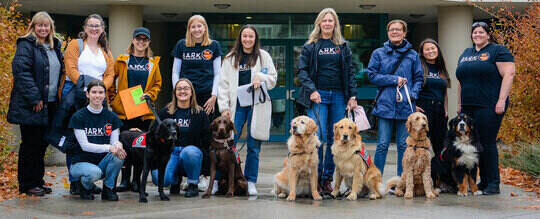-
EDN101
What is Teaching and Learning?
This module will introduce students to key factors that are relevant to effective teaching and learning. It will consider evidence for effective professional practice relating to learning environments, communication strategies and behaviour management. Students will explore the various roles of the educator in contemporary educational practice and theories of teaching and learning. Specific aspects influencing effective learning will also be introduced, for example attention, motivation and expectancy effects. Students will be encouraged to reflect on their own educational experiences in relation to effective teaching and learning practice.
-
EDN209
Animals in education: an introduction to educational anthrozoology
Can spending time with animals in an educational context be of benefit to children and young people? The area of anthrozoology, broadly defined as the study of the interactions and relationships between human and nonhuman animals explores this and other questions. Throughout history, people have interacted with a wide variety of animals, not only for food, clothing, protection, hunting and sport, but also as pets, companions, religious and artistic inspiration. One specific area in which there is a growing body of evidence is in the use of animals in educational contexts - this is educational anthrozoology.
In this module, students will consider the impact of educational programmes involving animals on the cognitive, behavioural, physical, emotional and social skills of learners. Students will consider how animals can enrich curriculum content and provision for learning. Students will explore how promoting and nurturing the empathy that young people often have towards animals is key in developing many important educational values including kindness, compassion and respect, as well as providing the opportunity to deepen knowledge and understanding of the world in which we live. Students will critically consider the existing knowledge base, and discuss the practical, ethical and moral implications of using animals in educational contexts.
-
EDP301
Professional Practice and Placement
The Professional Practice and Placement module is designed to enable student teachers to achieve the Professional Standards for Teaching and Leadership at Qualified Teacher Status (QTS) level. The module is based on a model of clinical practice. Clinical practice in teacher education requires student teachers to make connections between theory, research and practice in order to identify and embed effective pedagogical practices. This is achieved through high quality, integrated support from university tutors and school mentors throughout all placement experiences (Yendol-Hoppey and Hoppey, 2018; Harris et al, 2020).
Therefore this module supports student teachers to make meaningful connections between the academic and practical elements of teaching; exploring theory and practice in ways that directly inform professional understanding and knowledge and classroom practice. As well as classroom based placement activity at an individual level, the module provides opportunities for discussion and reflection through micro-teaching, team teaching, exploration of professional problem-based scenarios and structured reflective conversation. All of these opportunities allow student teachers to build, develop and share their professional knowledge with peers and mentors.
The module is primarily school based, and comprises two block-teaching placements; as well as 10 co-constructed and co-delivered Practice and Theory (PAT) days, which allow student teachers to make clear connections between theory and classroom practice, and to share experiences across their networks. The module also provides student teachers with opportunities to deepen their understanding of how children and adolescents learn, and to experience alternative educational settings (such as education departments in museums/scientific centres/ outdoor educational venues; early years settings; special schools and pupil referral units).
The principles of planning, teaching and assessment across a broad and balanced curriculum will be explored in the specific placement school context. In addition, the module provides practical opportunity to explore the complex nature of the physical, emotional and cognitive learning environment, and student teachers will consider how to meet the needs of a diverse range of learners. Over the module student teachers will develop the skills and understanding needed to manage learners, resources and the environment. Student teachers will have opportunities to establish professional working relationships with other adults such as parents, mentors, learning support staff and multidisciplinary professionals.
-
EDP301W
Arfer a Lleoliad Proffesiynol
Mae'r modiwl Arfer a Lleoliad Proffesiynol wedi'i gynllunio i alluogi athrawon dan hyfforddiant i gyflawni'r Safonau Proffesiynol ar gyfer Addysgu ac Arweinyddiaeth ar lefel Statws Athro Cymwysedig (SAC). Mae'r modiwl yn seiliedig ar fodel o ymarfer clinigol. Mae ymarfer clinigol mewn addysg athrawon yn ei gwneud yn ofynnol i athrawon dan hyfforddiant wneud cysylltiadau rhwng theori, ymchwil ac arfer er mwyn adnabod ac ymgorffori arferion addysgeg effeithiol. Cyflawnir hyn trwy gefnogaeth integredig o ansawdd uchel gan diwtoriaid prifysgol a mentoriaid ysgol trwy gydol yr holl brofiadau lleoliad (Yendol-Hoppey a Hoppey, 2018; Harris et al, 2020). Felly mae'r modiwl hwn yn cefnogi athrawon dan hyfforddiant i wneud cysylltiadau ystyrlon rhwng yr elfennau academaidd ac ymarferol o addysgu; archwilio theori ac arfer mewn ffyrdd sy'n llywio¿n uniongyrchol ddealltwriaeth a gwybodaeth broffesiynol ac arfer yn yr ystafell ddosbarth. Yn ogystal â gweithgaredd yn yr ystafell ddosbarth ar lefel unigol, mae'r modiwl yn darparu cyfleoedd ar gyfer trafod a myfyrio trwy ficro-ddysgu, addysgu mewn tîm, archwilio sefyllfaoedd proffesiynol sy'n seiliedig ar broblemau a sgyrsiau myfyriol strwythuredig. Mae'r holl gyfleoedd hyn yn galluogi athrawon dan hyfforddiant i feithrin, datblygu a rhannu eu gwybodaeth broffesiynol gyda chyfoedion a mentoriaid. Mae'r modiwl yn digwydd yn bennaf yn yr ysgol, ac mae'n cynnwys dau leoliad addysgu bloc; yn ogystal â 10 diwrnod Arfer a Theori wedi¿u cydlunio a¿u cyd-gyflwyno, sy¿n galluogi athrawon dan hyfforddiant i wneud cysylltiadau clir rhwng theori ac arfer yn yr ystafell ddosbarth, ac i rannu profiadau ar draws eu rhwydweithiau. Mae¿r modiwl hefyd yn rhoi cyfleoedd i athrawon dan hyfforddiant ddyfnhau eu dealltwriaeth o sut mae plant a phobl ifanc yn dysgu, a chael profiad o leoliadau addysgol amgen (megis adrannau addysg mewn amgueddfeydd/canolfannau gwyddonol/lleoliadau addysgol awyr agored; lleoliadau blynyddoedd cynnar; ysgolion arbennig ac unedau cyfeirio disgyblion). Bydd egwyddorion cynllunio, addysgu ac asesu ar draws cwricwlwm eang a chytbwys yn cael eu harchwilio yng nghyd-destun lleoliad penodol yr ysgol. Yn ogystal, mae'r modiwl yn rhoi cyfle ymarferol i archwilio natur gymhleth yr amgylchedd dysgu corfforol, emosiynol a gwybyddol, a bydd athrawon dan hyfforddiant yn ystyried sut i ddiwallu anghenion ystod amrywiol o ddysgwyr. Yn ystod y modiwl bydd athrawon dan hyfforddiant yn datblygu'r sgiliau a'r ddealltwriaeth sydd eu hangen i reoli dysgwyr, adnoddau a'r amgylchedd. Bydd athrawon dan hyfforddiant yn cael cyfleoedd i sefydlu perthnasoedd gwaith proffesiynol gydag oedolion eraill megis `rhieni, mentoriaid, staff cymorth dysgu a gweithwyr proffesiynol amlddisgyblaethol.
-
EDPM31
Exploring Pedagogy, Curriculum and Assessment in the Primary School
This module develops student teacher¿s understanding of and ability to employ effective strategies for teaching, learning and assessment across the primary age phase. The module will explore how children and adolescents learn, and what factors support and hinder effective learning. Student teachers will also explore the evidence-base around the characteristics of `good¿ teaching and the importance of establishing supportive learning environments.
Taught sessions will focus on the application of subject and phase-related knowledge to support an understanding of pedagogy. Student teachers will develop an understanding of the importance of providing a broad and balanced curriculum suitable for meeting the diverse needs of the pupils they teach. Student teachers will examine issues relevant to the wider context of Welsh Government policy on the curriculum and the national frameworks for Literacy, Numeracy and Digital Competence. The module will ensure that students gain an understanding of current legislation, including an understanding of the underpinning four purposes of the curriculum, and Curriculum Cymreig, ESDGC, religious education, Children¿s Rights and the Welsh language.
Students will learn about the importance of critical reflection and reflective practice for professional development and school improvement by considering, applying and critiquing reflective models such as Schön and Brookfield. They will apply this critical reflection to their own professional practice, reflecting on their teaching and assessment strategies to ensure they are appropriate in supporting effective learning.
-
EDPM31W
Archwilio Addysgeg, Cwricwlwm ac Asesu yn yr Ysgol Gynradd
Mae¿r modiwl hwn yn datblygu dealltwriaeth athrawon dan hyfforddiant o strategaethau effeithiol ar gyfer addysgu, dysgu ac asesu ar draws y cyfnod cynradd a¿u gallu i¿w defnyddio. Bydd y modiwl yn archwilio sut mae plant a phobl ifanc yn dysgu, a pha ffactorau sy'n cefnogi ac yn rhwystro dysgu effeithiol. Bydd athrawon dan hyfforddiant hefyd yn archwilio sylfaen tystiolaeth o amgylch nodweddion addysgu `da¿ a phwysigrwydd sefydlu amgylcheddau dysgu cefnogol. Bydd sesiynau a addysgir yn canolbwyntio ar gymhwyso gwybodaeth sy¿n ymwneud â phwnc a chyfnod i gefnogi dealltwriaeth addysgeg. Bydd athrawon dan hyfforddiant yn datblygu dealltwriaeth o bwysigrwydd darparu cwricwlwm eang a chytbwys sy'n addas ar gyfer diwallu anghenion amrywiol y disgyblion y maent yn eu haddysgu. Bydd athrawon dan hyfforddiant yn archwilio materion sy¿n berthnasol i gyd-destun ehangach polisi Llywodraeth Cymru ar y cwricwlwm a¿r fframweithiau cenedlaethol ar gyfer Llythrennedd, Rhifedd a Chymhwysedd Digidol. Bydd y modiwl yn sicrhau bod myfyrwyr yn dod i ddeall y ddeddfwriaeth gyfredol, gan gynnwys dealltwriaeth o bedwar diben sylfaenol y cwricwlwm, a¿r Cwricwlwm Cymreig, ADCDF, addysg grefyddol, Hawliau Plant a¿r Gymraeg. Bydd myfyrwyr yn dysgu am bwysigrwydd myfyfyrio beirniadol ac arfer myfyriol ar gyfer datblygiad proffesiynol a gwella¿r ysgol trwy ystyried, cymhwyso a beirniadu modelau adfyfyriol megis Schön a Brookfield. Byddant yn cymhwyso'r myfyrio beirniadol hwn i'w harfer proffesiynol eu hunain, gan fyfyrio ar eu strategaethau addysgu ac asesu i sicrhau eu bod yn briodol wrth gefnogi dysgu effeithiol.
-
EDPM32
The Research-informed Reflective Practitioner
The vision of the Swansea University Schools¿ Partnership is to enable student teachers to become `research-informed, reflective practitioners¿. This module supports student teachers achieve this vision through offering opportunities to develop and extend research literacy and reflective skills and dispositions, and their knowledge and understanding of classroom research and enquiry.
This module therefore offers a range of learning experiences designed to enhance student teacher¿s critical awareness of educational research, so that they can refine their teaching, influence their pupils and ensure they make progress with their pedagogical skills and knowledge (Welsh Government circular, 001/2018). Throughout the module, student teachers will develop an awareness and understanding of research skills and research literacy that will help them throughout their professional career. This will systematically develop their professional practice and allow them to respond creatively to the needs of all pupils in their classrooms.
Within their chosen age phase, student teachers will select an appropriate focus for enquiry. They will critically examine the existing evidence base in this area, and use this to plan a project to explore their own practice through the implementation of a small-scale close to practice enquiry. In doing so they will also have the opportunity to reflect critically on their own practice, and where appropriate make changes and refinements to this practice based on their enquiry. They will share their findings with peers and Partnership colleagues during the programme, for example at the annual PGCE Research conference, or via the department¿s website and `Research into Practice¿ Centre.
-
EDPM32W
Yr Ymchwilydd Myfyriol wedi ei lywio gan Ymchwil
Gweledigaeth Partneriaeth Ysgolion Prifysgol Abertawe yw galluogi athrawon dan hyfforddiant i ddod yn `ymarferwyr myfyriol wedi¿u llywio gan ymchwil¿. Mae¿r modiwl hwn yn cefnogi athrawon dan hyfforddiant i gyflawni¿r weledigaeth hon trwy gynnig cyfleoedd i ddatblygu ac ymestyn llythrennedd ymchwil a sgiliau a thueddiadau myfyriol, a¿u gwybodaeth a¿u dealltwriaeth o ymchwil ac ymholi yn yr ystafell ddosbarth. Mae¿r modiwl hwn felly¿n cynnig ystod o brofiadau dysgu wedi¿u cynllunio i wella ymwybyddiaeth feirniadol athrawon dan hyfforddiant o ymchwil addysgol, fel y gallant fireinio eu dulliau addysgu, dylanwadu ar eu disgyblion a sicrhau eu bod yn gwneud cynnydd gyda¿u sgiliau a¿u gwybodaeth addysgegol (cylchlythyr Llywodraeth Cymru, 001/2018). Drwy gydol y modiwl, bydd athrawon dan hyfforddiant yn datblygu ymwybyddiaeth a dealltwriaeth o sgiliau ymchwil a llythrennedd ymchwil a fydd yn eu helpu nhw drwy gydol eu gyrfa broffesiynol. Bydd hyn yn datblygu eu harfer proffesiynol yn systematig ac yn caniatáu iddynt ymateb yn greadigol i anghenion yr holl ddisgyblion yn eu dosbarthiadau. O fewn eu cyfnod oedran dewisol, bydd athrawon dan hyfforddiant yn dewis ffocws priodol ar gyfer ymholi. Byddant yn archwilio'n feirniadol y sylfaen dystiolaeth bresennol yn y maes hwn, ac yn ei defnyddio i gynllunio prosiect i archwilio eu harfer eu hunain trwy weithredu ymholiad agos i ymarfer ar raddfa fach. Wrth wneud hynny byddant hefyd yn cael y cyfle i fyfyrio'n feirniadol ar eu harfer eu hunain, a lle bo'n briodol newid a mireinio'r arfer hwn yn seiliedig ar eu hymholiad. Byddant yn rhannu eu canfyddiadau â chymheiriaid a chydweithwyr y Bartneriaeth yn ystod y rhaglen, er enghraifft yn y gynhadledd Ymchwil TAR flynyddol, neu drwy wefan yr adran a¿r Ganolfan `Ymchwil i Ymarfer¿.
-
PM-366
Teaching Science
This module is for students with an interest in teaching, science communication, and medicine. Students will complete an enquiry-based research project, based within the field of pedagogy or science communication, with guidance from an academic supervisor. Projects may be completed in collaboration with local schools/colleges, community groups, science outreach programmes (e.g. Oriel Science), in clinical/patient settings, or within Higher Education. Students will engage with workshops and digital resources to introduce various themes surrounding pedagogy and science communication to prepare them for their research project. Students will be required to critically analyse their research findings and produce a teaching or outreach activity/resource. Students will refine their oral and written communication skills to graduate level through an oral presentation and dissertation.
-
PM-366C
Addysgu Gwyddoniaeth
Mae'r modiwl hwn ar gyfer myfyrwyr sydd â diddordeb mewn addysgu, cyfleu gwyddoniaeth a meddygaeth. Bydd myfyrwyr yn cwblhau prosiect ymchwil sy'n seiliedig ar ymholiadau, ym maes addysgeg neu gyfleu gwyddoniaeth, o dan arweiniad goruchwyliwr academaidd. Gellir cwblhau prosiectau mewn cydweithrediad ag ysgolion/colegau lleol, grwpiau cymunedol, rhaglenni allgymorth gwyddoniaeth (e.e. Oriel Science), mewn lleoliadau clinigol/cleifion neu ym myd Addysg Uwch. Bydd myfyrwyr yn ymgysylltu â gweithdai ac adnoddau digidol i gyflwyno themâu amrywiol ynghylch addysgeg a chyfleu gwyddoniaeth i'w paratoi ar gyfer eu prosiect ymchwil. Gofynnir i fyfyrwyr ddadansoddi canfyddiadau eu hymchwil yn feirniadol a llunio gweithgaredd/adnodd addysgu neu allgymorth. Bydd myfyrwyr yn mireinio eu sgiliau cyfathrebu llafar ac ysgrifenedig i lefel raddedig drwy roi cyflwyniad poster a llunio traethawd hir.
-
SS-S000
Year in Industry - School of Social Sciences
The placement will start in June-August and completes one calendar year later (or thereabouts).
Students must complete a minimum of 40 full time (at least 30 hour) weeks on placement with the company (up to two holiday weeks may be counted against this total).



